Want to join Karina and ~300 software crafters from around Europe?
Register now for I T.A.K.E Unconference 2017!

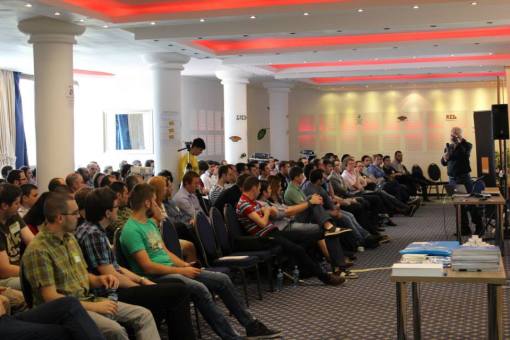 Software Craft
Software Craft
“Whatever luck I had, I made. I was never a natural athlete, but I paid my dues in sweat and concentration and took the time necessary to learn Karate and become World Champion.” – Chuck Norris (American martial artist and actor. Also, the only man who has counted to infinity. Twice.)
Japanese concepts from martial arts become common practices in software craftsmanship. It is known that thousands of software developers aiming to become craftsmen are mastering their skills using them.
In fact, in the software industry developers are taught the theory and thrown straight into working on a project. The practice is done on the job, and mistakes occur. Applying the theory is not enough, greatness comes from practising. What makes a programmer to be great is the practice done beyond the software development current job. That’s why so many developers nowadays practice Code Kata.
In karate a kata is an exercise where you repeat a form many times, making small improvements each time. The intent behind code kata is similar. Each iteration is a short exercise (about 30′ to 1-hour duration). The point of the kata is not arriving at the right solution, but to learn some stuff along the way. The only goal is to practice.
Exercise your programming muscles in a way you enjoy and see the progress you make.
A code kata is an exercise in programming which helps a programmer improve their skills through practice and repetition. The term is considered to be coined by Dave Thomas, co-author of the book The Pragmatic Programmer: From Journeyman to Master, in a bow to the Japanese concept of kata in the martial arts.
Repeat solving the same problem (as the one below), until you know it by heart. You can be sure the next time it pops-up in production it will take you seconds to get it done.
Think of binary numbers: sequences of 0’s and 1’s. How many n-digit binary numbers are there that don’t have two adjacent 1 bits? For example, for three-digit numbers, five of the possible eight combinations meet the criteria: 000, 001, 010, 011, 100, 101, 110, 111. What is the number for sequences of length 4, 5, 10, n? Having worked out the pattern, there’s a second part to the question: can you prove why that relationship exists?
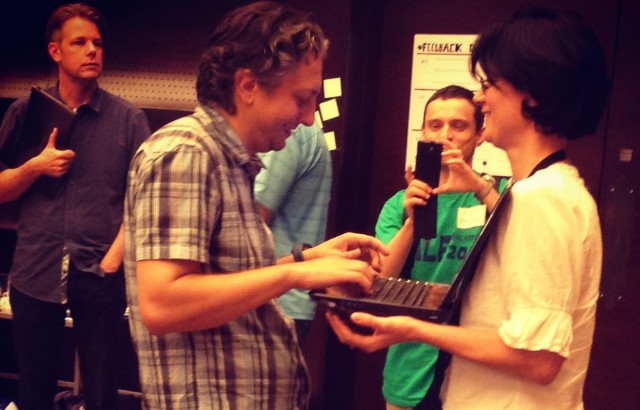 Practice
Practice
Whether you are interested to get your hands dirty with code, or to bring improvement ideas to a software product, there’s a Product Development Track along the I T.A.K.E. Unconference. Join, stay, leave or return anytime you want during the 2-day program.
Short answer: To experience live Software Craftsmanship practices.
Long Answer: Skeptical the 2-day unconference result can be a demo for a working software product?
Join the team producing live software, experience the agile development process, and contribute in short increments, with peers like you, spending as much time as you choose. Whenever you check the Product Development track, you’ll find there either the organizing team:
or the contributors to the development:
playing with Software Craftsmanship practices while developing a product. Whether you come to code, test, or add to the Product Backlog, all contributions will lead to a product launch by the end of 2nd day.
You can join this track anytime and work with the team as long as you want. To get started fast, they will help you get productive and waste no time. Just choose an iteration and work on an increment during a short timebox.
This year we will offer to the participants the possibility to write the code in any of the following languages: Java, Node.Js, Python, Ruby, PHP. For each of these, we will have prepared a walking skeleton as a starting point.
To quickly become productive, please install: Java 8, Gradle, Grunt and Git.
Because we value your dedication and your effort, every contribution to the Product Development track will be taken into consideration for the contest to win a special prize. All you have to do is to submit a pull request implementing a feature, to find or fix a bug, or to improve the product in any visible way. The organizers serving as a jury will vote for the most valuable contribution and award the prize at the end of the second day. In order to participate in this contest, you do not need to register before the event. You just need to show up at the Product Development track during the conference and contribute!
Don’t miss the Product Development as well as many other hands-on sessions at I T.A.K.E. Unconference.
 Tips
Tips
I am excited to share a few thoughts about writing software for abstract domains, such as the humanities and the liberal arts, at the I T.A.K.E. Unconference. My formal background in computer science and filmmaking informs how I make qualitative choices in the quantitative domain of software. I’ll share historical experiences from tooling to implementation, and discuss how this approach can even benefit conventional problem sets in commercial applications.
“Preparing detailed examples to show various scenarios of how the system will be used can have a huge impact on the testability of the system especially when it is the development teams job to automate the execution of those examples. All of a sudden, it becomes in developers best interests to make the system testable! And therefore the system becomes more easily tested.”
There is a huge competition in the software development market for the best job, fancy technologies, big money. Trying to outcompete others with technical skills is doomed to fail because surprisingly, most of our success is not due to technical abilities. I will share practical tricks that will accelerate and significantly improve your engineering career.
What is computer science? How do we measure if a programming teaching method is better than another? I’ll explain how we can organize research into computer science and what impact have educational programming programs?
 Announcements
Announcements
Enjoy the following series of interviews with the speakers, top-notch software crafters from across Europe, joining I T.A.K.E Unconference, Bucharest, 11-12 May. Discover the lessons learned and what drives them to challenge the known path in their field.
Karina Popova, Head of Development at Link Mobility, as been working as DevOps Lead last 10 years. At #itakeunconf she will include in her talk a lot of real working IoT use cases and their potential impact of a combination IoT with AI.
The five most important thing for my growth includes:
1. Education, I have spent almost 20 years studying and it was a key point in my professional growth.
2. Travelling, meeting people with different culture and observing their solutions.
3. Reading, especially biographies, as history always repeats.
5. Attending IT events, to learn the basics of new technologies, keep track of trends and have an awesome deep conversations
Attendees will learn what is the potential impact of AI in the IoT sphere, what real IoT use cases with AI on top have been already implemented and how can we increase the quality of life with the AI+IoT.
Three most important sources for inspiration before my talk are the book “The Hitchhiker’s Guide to the Galaxy”, the movie “Bicentennial Man” and my Instagram.
Want to join Karina and ~300 software crafters from around Europe?
Register now for I T.A.K.E Unconference 2017!
 Announcements
Announcements
I play GO (or wieki) – an ancient Chinese strategy game – unfortunately less often, I enjoy reading Fantasy and Sci-Fi literature, but one of the books I enjoyed reading is a military treaty – Sun Tzu’s Art of War, and one of my favorite authors is Mario Vargas Llosa, from a professional perspective Patrick Lencioni – The Advantage was an inspiration. And to conclude – the best source of information is the team you work with, they will show you what you need to learn so you can work together.
Want to join Liviu and ~300 software crafters from around Europe?
Register now for I T.A.K.E Unconference 2017!
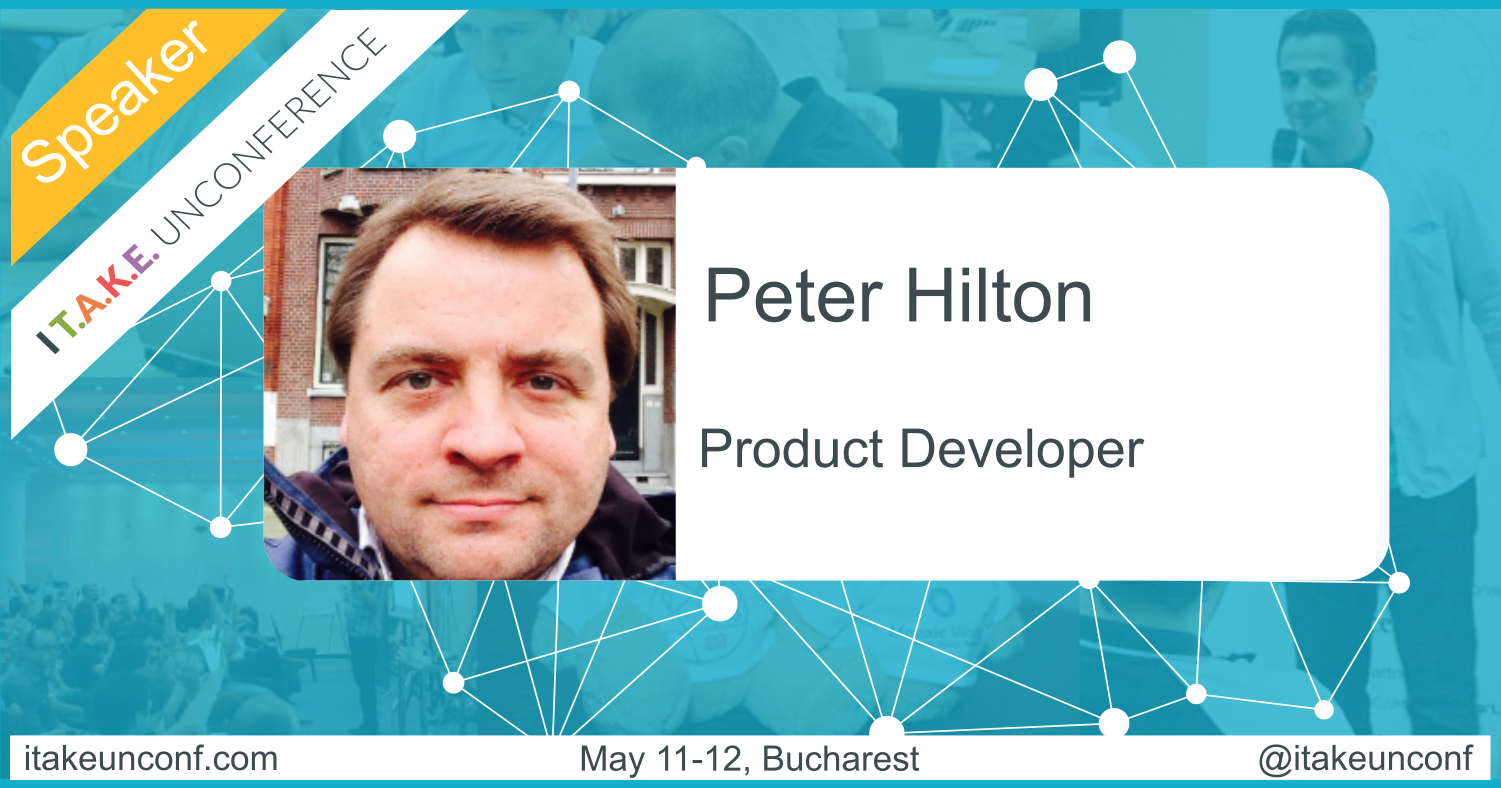 Announcements
Announcements
Enjoy the following series of interviews with the speakers, top-notch software crafters from across Europe, joining I T.A.K.E Unconference, Bucharest, 11-12 May. Discover the lessons learned and what drives them to challenge the known path in their field.
Peter Hilton is a software developer, writer, speaker, trainer, and musician. Peter’s professional interests are business process management, web application development, functional design, agile software development, and documentation. He will present at #itakeunconf a session about documentation for software developers.
The things that helped me grow the most were starting to do something that I later developed a lot further: travel, presenting, writing, management, and coding. These influences on my professional development were taking overseas assignments and later moving permanently to another country, presenting to colleagues and later at conferences, writing a tech blog and later a published book, leading a team and later taking on a management role. As for coding, the most important thing was to never-never give it up and always have something new to learn.
My workshop will help participants address the hardest challenge in software documentation: learning how to take the first step from no documentation at all to the minimum viable documentation. The hard part is understanding what you can do, without wasting time on too much documentation.
iMy passion is figuring how to explain software and make it maintainable. I was originally inspired to learn more about this after reading Steve McConnel’s book Code Complete, as well as many other books about software development. I discuss my favourite aspect of making code understandable in my Software Engineering Radio interview on naming things.
I’ve always found talking to other people the best way to develop and refine my own ideas. This inevitably lead to conference presentations, for which my greatest influence is Kevlin Henney’s presentations.
Perhaps my greatest inspiration is the real world, which I enjoy exploring. My favourite way to learn about a new city and immerse myself in it is to explore its cafes, which I started doing on business trips and overseas assignments when I had a hotel room instead of a home to stay in. Writing cafe reviews on my own web site, before the likes of TripAdvisor was invented, was also how I started to explore writing. Today, there’s still probably as much writing about cafes as about programming on my own blog.
Want to join Peter and ~300 software crafters from around Europe?
Register now for I T.A.K.E Unconference 2017!
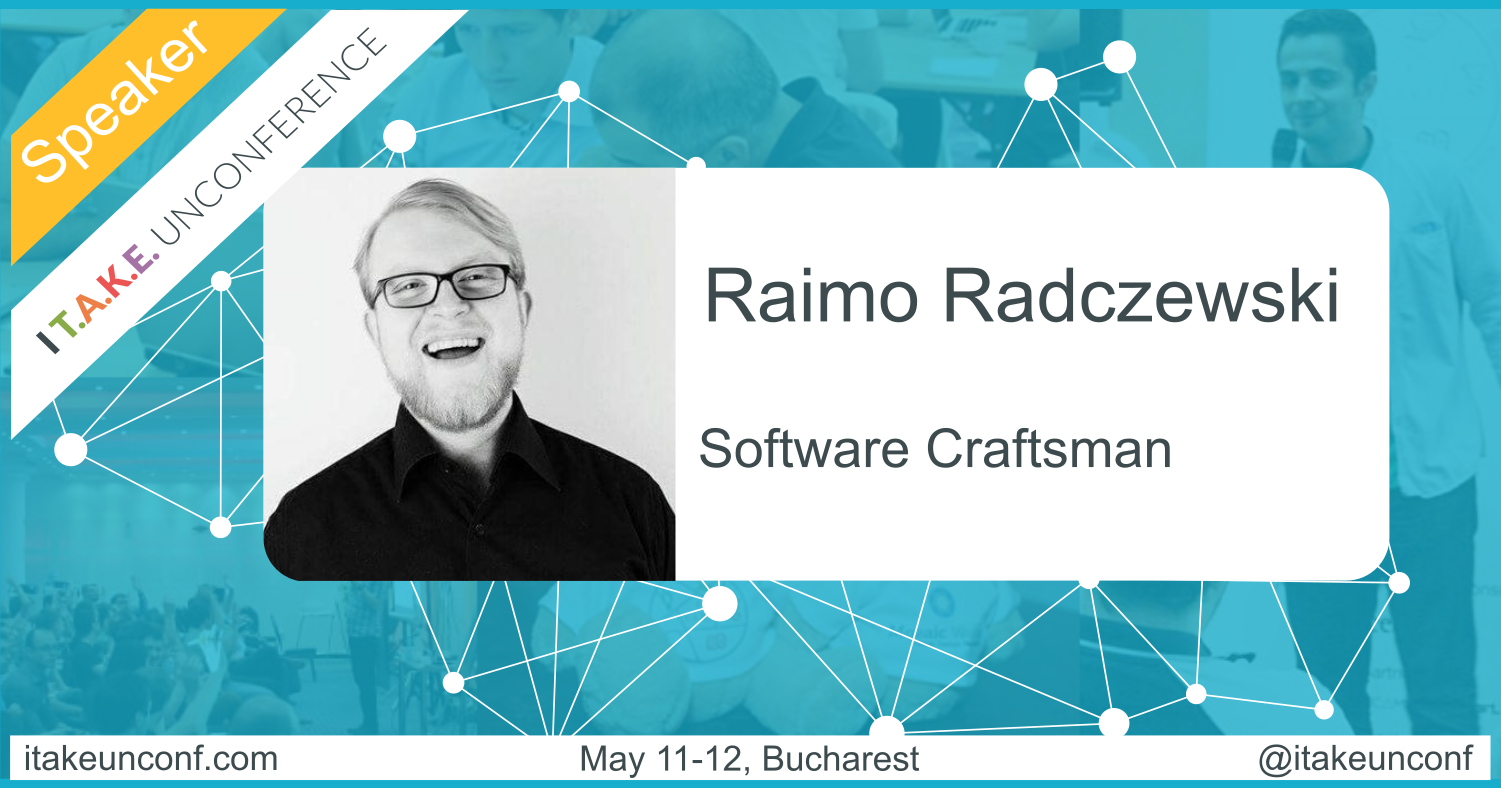 Announcements
Announcements
Enjoy the following series of interviews with the speakers, top-notch software crafters from across Europe, joining I T.A.K.E Unconference, Bucharest, 11-12 May. Discover the lessons learned and what drives them to challenge the known path in their field.
Raimo Radczewski is a freelancing software craftsman living in Berlin, Germany. He’s organizing Berlin’s Software Craftsmanship Community where he supports craftspeople with professionalizing and sharpening their skills, but also reflect on their current practices and how they can work better as teams. At #itakeunconf he will be sharing about Remote Pair-programming.
I think the most important thing that shaped my career has been the Software Craftsmanship movement. I first went to an OpenSpace in 2012, then Coderetreats, then SoCraTes, then organizing OpenSpaces and such. The community has really supported me and helped me grow in every professional aspect I could think of.
The most challenging part of working remote is keeping an inter-human connection to the person on the other side to make up for the tools that so rarely work. It also helps to use the least-broken tools and find a structure that works for the individuals that want to pair up.
I draw most of my inspiration from visiting and organizing events in the communities. Additionally, the Software Craftsmanship Slack Team is a great place to start discussing with craftspeople all over the world.
Want to join Raimo and ~300 software crafters from around Europe?
Register now for I T.A.K.E Unconference 2017!
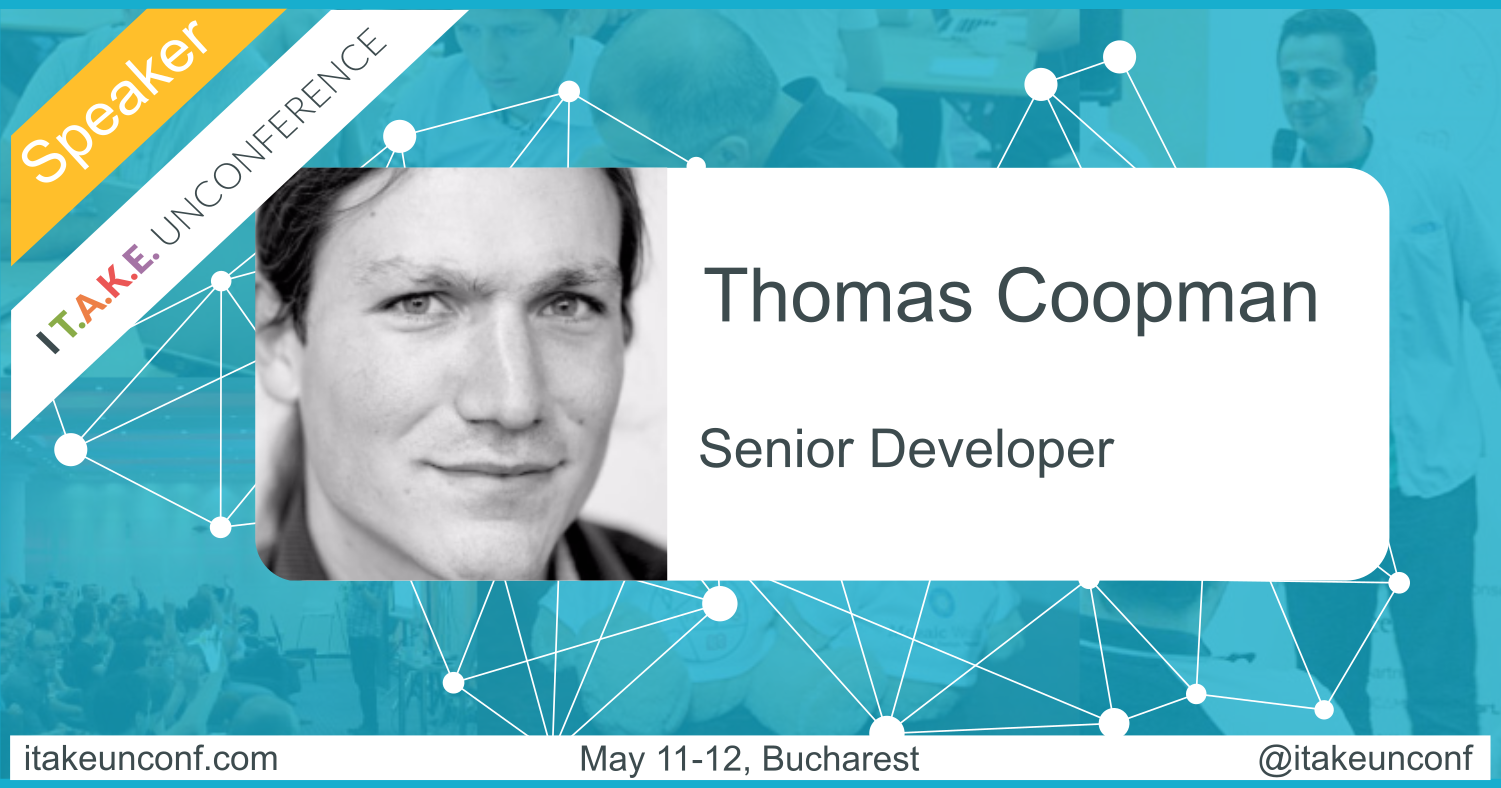 Announcements
Announcements
Enjoy the following series of interviews with the speakers, top-notch software crafters from across Europe, joining I T.A.K.E Unconference, Bucharest, 11-12 May. Discover the lessons learned and what drives them to challenge the known path in their field.
Thomas Coopman is an independent software engineer and consultant focused on the full stack: frontend, backend and mostly people, practices and processes. At #itakeunconf, in his hands-on session, the participants will be implementing projections based on an event stream we provide.
I draw most of my inspiration from visiting and organizing events in the communities. Additionally, the Software Craftsmanship Slack Team is a great place to start discussing with craftspeople all over the world.
1) Experimenting with different career choices until it felt good
2) Exchanging experiences with fellow professionals by attending meetups, usergroups and conferences
3) Fighting the urge to assume I’m always right
4) Limiting the subjects I’m willing to learn and invest time in
5) Investing in my communication techniques. I’m continuously learning to speak non-techie. I’m practicing speaking in front of an audience.
The ability to extract useful knowledge from a store of historical events.
1) The Software Craftsmanship and Testing community are awesome. Reach out to them.
2) Listen to any podcast or audiobook during your commute. It’s far better for your personal growth than listening to the (mostly bad) news on the radio. I particularly like these podcasts: Star Talk Radio and Hardcore History.
3) Pick up a musical instrument and learn to play it adequately. I tend to relax with a guitar in my hands or a piano at my fingertips.
Want to join Thomas and ~300 software crafters from around Europe?
Register now for I T.A.K.E Unconference 2017!
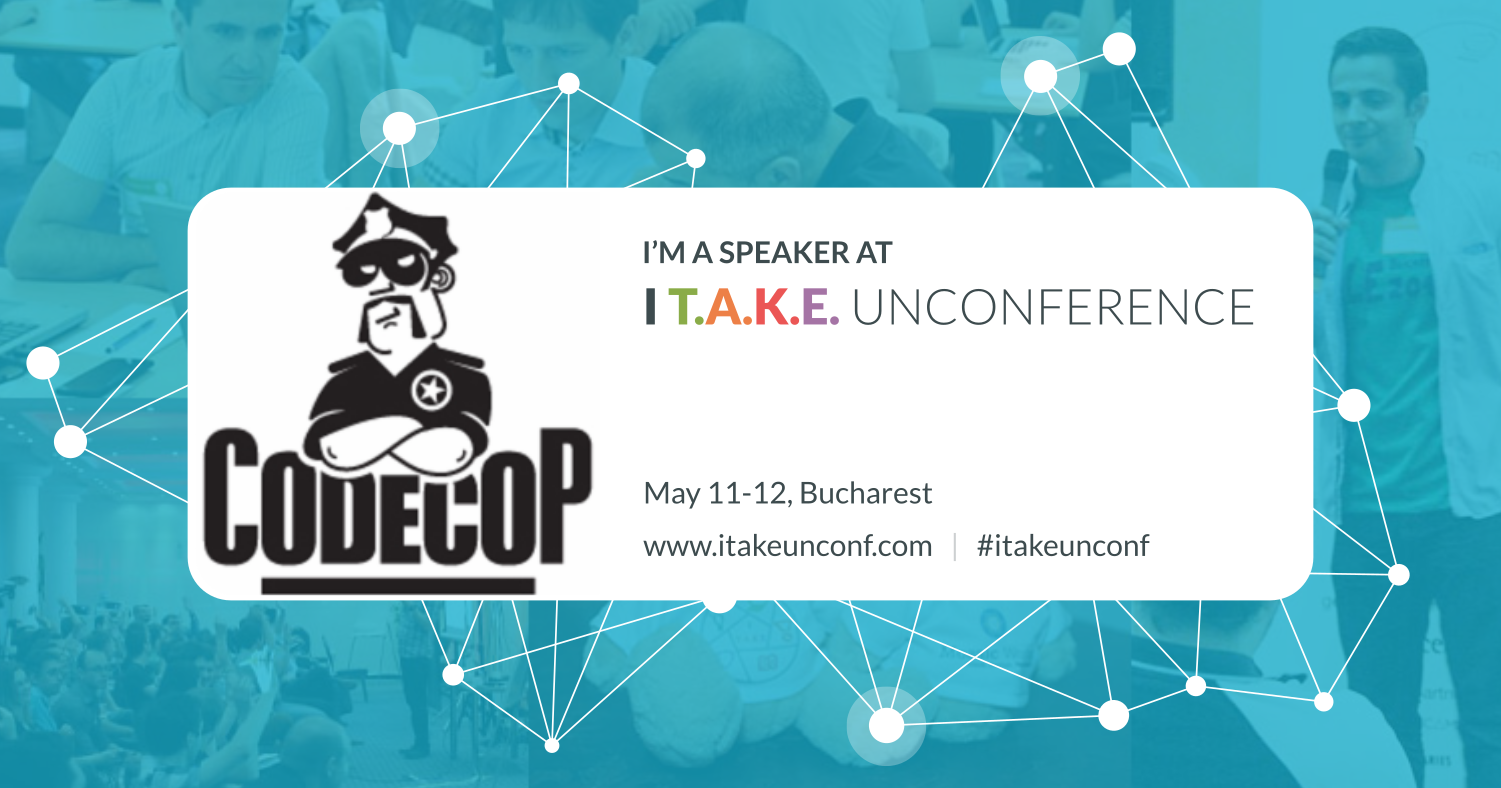 Announcements
Announcements
Enjoy the following series of interviews with the speakers, top-notch software crafters from across Europe, joining I T.A.K.E Unconference, Bucharest, 11-12 May. Discover the lessons learned and what drives them to challenge the known path in their field.
Peter Kofler is a software developer since 17 years and still enthusiastic about writing code. At I T.A.K.E Unconference, he will share more about Brutal Coding Constraints.
1. The biggest thing I did that changed me was a Journeyman Tour. For three months I visited different companies in Vienna and paired with their developers. See here for more information. (Three Month Journeyman Tour)
2. This included a lot of pair programming with strangers. I like pair programming and make use of it to learn from others. (Pair Programming)
3. I did (and still do) a lot of Code Katas to practice and experiment with code, patterns, and design. (Code Katas)
4. Try to continuously improve.
5. Read technical books.
Yes, my session, the Brutal Coding Constraints, is a real challenge. It challenges our perception of Object Orientation and aims to deepen our understanding.
* Michael Feathers – The Deep Synergy Between Testability and Good Design
* Bryan Liles – TATFT – Test All the F…in Time
* J.B. Rainsberger – The Worlds Best Introduction to TDD
Want to join Peter and ~300 software crafters from around Europe?
Register now for I T.A.K.E Unconference 2017!